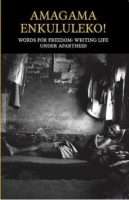Today’s equalisers are heirs to generations of resistance. Some of the voices of South Africa’s struggle for freedom from colonial and Apartheid rule are captured in this book. It is a rich collection with works ranging from a 1929, poignant story by RRR Dhlomo, to a 1964 Nat Nakasa non-fiction piece, to the poetry of Oswald Mtshali that gained popularity after the publication of his anthology in 1971, to the musings of the contemporary cultural commentator Eric Miyeni. These works speak eloquently of our past, but they also speak of our present, for indeed the past is a strong presence in our present.
Why do you keep harping on about the past? The past is gone, done and buried. Why can’t you just forget it and move on? You said you forgave the past, so why can’t you forget it as well?
These are questions we often hear whenever a project that explores the past, such as this one, is initiated. Some of us tend to think that forgiving and forgetting are either the same thing or should, of necessity, go together.
To forget the past is not only to have amnesia about where we come from but about who we are. Like all members of the human race we are who we are today because of who we were yesterday. We have been shaped by our past for better or for worse. Our very identities are tied in with our individual and collective memory. We are often reminded of the saying: you will not know where you are going unless you know where you come from.
Forgetting the past would be forgetting the legacy the writers in this collection have bequeathed us, and indeed all other legacies that have shaped our humanity.
However, we must not remember the past selectively. We often hear that history is actually the story of the victor. We only hear of the events in which those who triumphed and became the ruling elite participated, to the exclusion of all others who also played a crucial role in our struggle, and made those victories possible. We hear this history only from the perspective of the ruling elite, valorising themselves and toasting their heroic exploits with expensive champagne, while the masses look on and have only their saliva to swallow. The stories and poems such as we have in this collection remind us that the ordinary people who bore the brunt of colonial and Apartheid oppression are the true makers of history. We forget that at our peril.
The most important thing about remembering the past is not just to honour and celebrate those who fought for liberation, it is to reflect on the inhumanity of what was done to us, so that when we have attained some power we do not do the same to others. Alas, our memories are short and the arrogance of power knows no bounds. That is why quite often yesterday’s victim and survivor become today’s perpetrator and persecutor.
We must remember the past, yes, but we must not be steeped in it and live only for it. In that instance we become immobilized by perpetual victimhood. The heroism of yesteryear does not feed your stomach today. We do not want to be like a stuck car whose tyres keep spinning in the mire, unable to move forward. We move on, we act, we achieve, we hold those in power accountable as equalisers do every day. For we are working for the future. One way of working for that future is to keep a record – even if it is just a journal – of the present, of how things are and what you did to make them better for you and those who will come after you. Hopefully after reading the stories and poems in this collection you’ll be inspired to write your own. There is a writer, or at least a storyteller, in all of us.
Zakes Mda


